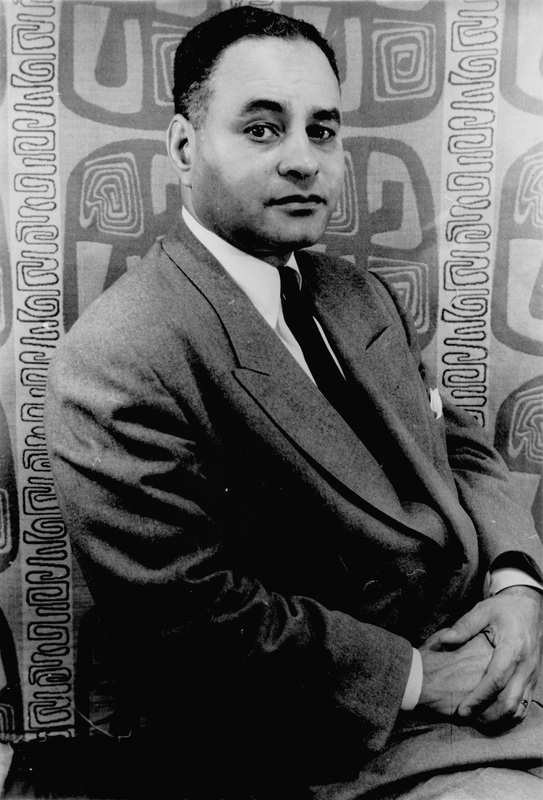Honoring Ralph Bunche and His Legacy of Peace
The majority of Bunche’s childhood was spent in Detroit, Michigan, although for a period his family lived in Toledo, Ohio. Bunche’s father, Fred, was a barber, and his mother, Olive, a musician. Bunche’s father left the family, but followed them to Albuquerque, New Mexico in 1915. In Albuquerque they joined Bunche’s maternal grandmother, who was helping out with Bunche and his two sisters because of his mother’s declining health. At the age of thirteen Bunche lost his mother and then his uncle, who committed suicide three months after his mother’s passing. Bunche’s maternal grandmother became the legal guardian of him and his two younger sisters and took them to Los Angeles, where he would live out his teenage years.
Bunche radiated intelligence, earning the position of valedictorian of Jefferson High School. He went on to attend the University of California, Los Angeles, where he graduated summa cum laude in 1927. In order to attend graduate school, Bunche’s community raised money to supplement his scholarship at Harvard University, where he graduated with a Masters and PhD in political science. The feat made Bunche the first African American to earn a doctorate degree in Political Science in the United States. From 1936 to 1938, Bunche travelled the world studying anthropology with the aid of a Social Science Research Council fellowship. Greatly interested in portrayals of race world-wide, Bunche wrote A World View of Race in 1936. Bunche continued pursuing research in anthropology for the latter part of his career, contributing to An American Dilemma, Gunnar Myrdal’s seminal study of race in the U.S.
The next couple of years brought Bunche out of academia and into world events. During World War II, Bunche first worked for the Office of Strategic Services before being transferred to the State Department as Associate Chief of the Division of Dependent Area Affairs. The position helped him become a leader at the Institute of Pacific Relations. After the war ended, he helped to create the United Nations (UN), working with First Lady Eleanor Roosevelt to draft and gain passage for the Universal Declaration of Human Rights.
Bunche continued to be involved with the United Nations which lead him to intervening in the Arab-Israeli conflict in 1948. He was part of a delegation from the UN Special Committee on Palestine when the head mediator was assassinated. Bunche took over and negotiated a plan with Egypt, Jordan, Lebanon, Syria and the newly formed Israel, which became the 1949 Armistice Agreements. It ended the 1948 Arab-Israeli War, setting boundaries between the nations and calling for the UN to monitor those lines, which held until the 1967 Six-Day War. The deal rendered Bunche a hero in the U.S., receiving a ticker tape parade upon his return. As a result of Bunche’s success he received over thirty honorary degrees, was awarded the Spingarn Prize by the NAACP in 1949, and, in 1950, was awarded the Nobel Peace Prize.
Bunche was also a strong advocate of the Civil Rights Movement. As Chair of the Department of Political Science at Howard University from 1928 to 1950, Bunche was regarded as a young radical who strongly opposed segregation. Proving that he had the courage of his convictions, he firmly declined President Truman’s offer of the position of Assistant Secretary of State because of segregation in the Virginia-D.C. corridor. He also founded the National Negro Congress to bring together white and black workers, as well as intellectuals, to unite against shared grievances and issues. Later, he walked alongside Martin Luther King Jr. during the March on Washington in 1963 and in Alabama for voting rights two years later.
Bunche continued to work at the UN for the rest of his life, later facilitating the decolonization process and staunchly advocating for those new nations’ right to self-determination. He passed on December 9, 1971 in New York City and thousands of people gathered to pay tribute to his enduring work and legacy. Today he is remembered as someone who not only helped craft but also helped enforced the mission of the UN, saying that “the United Nations has had the courage that the League of Nations lacked – to step in and tackle the buzz saw.” He remained steadfastly committed to the ideals and aspirations of the institution and its ability to resolve conflict, stating in his Nobel acceptance speech that the UN, “with unshakable resolution, in the future as in the past, will continue to man the dikes of peace.”

